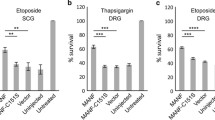Summary
Glutamate induced neurotoxicity has been proposed to account for the loss of neurons after ischemia as well as in the cause of neurodegenerative diseases. We have studied the effects of exogenous glutamate on survival of neurons from chick embryo telencephalon, precultured with a peptide derivative for 8 days. The peptide derivative Cerebrolysin® is a drug produced by standardised enzymatic breakdown consisting of 80% peptides and 20% amino acids. Toxic effects of acute glutamate exposure were prevented by Cerebrolysin in a concentration-dependent manner. 20 and 40µl Cerebrolysin produce distinct neuroprotective effects. However, 80µ1 Cerebrolysin/ml nutrition medium more than doubles neuronal viability compared to untreated control cells. These concentration-dependent effects of Cerebrolysin were evident even at the light microscopic level.
Access this chapter
Tax calculation will be finalised at checkout
Purchases are for personal use only
Preview
Unable to display preview. Download preview PDF.
Similar content being viewed by others

References
Barde A (1989) Trophic factors and neuronal survival. Neuron 2: 1525–1534
Choi DW (1987) Ionic dependence of glutamate neurotoxicity. J Neurosci 7: 369–379
Choi DW (1990) Methods for antagonising glutamate neurotoxicity. Cerebrovasc Brain Metab Rev 2: 105–147
Choi DW, Koh JY, Peters S (1988) Pharmacology of glutamate neurotoxicity in cortical culture: attenuation by NMDA antagonists. J Neurosci 8: 185–196
Drian MJ, Kamenka JM, Pirat JL, Privat A (1991) Non-competitive antagonist of Nmethyl-D-aspartate prevent spontaneous neuronal death in primary cultures of embryonic rat cortex. J Neurosci Res 29: 133–138
Greenamyre JT (1986) The role of glutamate in neurotransmission and neurologic disease. Arch Neurol 43: 1058–1063
Gschanes A, Windisch M, Bures J (1993) Cerebrolysin, a peptidergic drug increases performance of ischemic rats in the Morris water maze. Eur J Neurosci [Suppl 6]: 140
Lauritzen M, Hansen AJ (1992) The effect of glutamate receptor blockade on anoxic depolarisation and cortical spreding depression. J Cereb Blood Flow Metab 12: 223–229
Maragos WF, Greenamyre JT, Penny JB, Young AB (1987) Glutamate dysfunction in Alzheimer’s disease: a hypothesis. Trends Neurosci 10: 65–68
Matteson MP, Murrain M, Guthrie PB, Kater SB (1989) Fibroblast growth factor and glutamate: opposing action in the generation and degeneration of hippocampal neuroarcitecuture. J Neurosci 9: 3728–3740
Meldrum B, Garthwaite J (1990) Excitatory amino acid neurotoxicity and neurodegenerative disease. Trends Pharmacol Sci 11: 379–387
Morris RGM (1989) Synaptic plasticity and learning: selective impairment of learning in rats and blockade of long-term potentiation in vivo by the N-methyl-D-aspartate receptor antagonist AP5. J Neurosci 9: 3040–3057
Mosmann T (1983) Rapid colorimetric assay for cellular growth and survival: application to proliferation and cytotoxic assays. J Immunol Methods 65: 55–63
Olney J, Price M, Salles KS, Labruyere J, Friedrich G (1987) MK-801 powerfully protects against N-methyl-D-aspartate neurotoxicity. Eur J Pharmacol 141: 357–361
Paier B, Windisch M, Eggenreich U (1992) Postnatal administration of two peptide mixture affects passive avoidance behaviour of young rats. Behav Brain Res 51: 23–28
Pettmann B, Louis JC, Sensenbrenner LM (1979) Morphological and biochemical maturation of neurons cultured in the absence of glia cells. Nature 281: 378–380
Piswanger A, Paier B, Windisch M (1990) Modulation of protein synthesis in a cell free system from rat brain by Cerebrolysin during development and ageing. In: Lubec G, Rosenthal GA (eds) Amino acids. Escom Sciences Publishers B.V., Leiden, pp 651–657
Plaitakis A, Caroscio JT (1987) Abnormal glutamate metabolism in amyotrophic lateral sclerosis. Ann Neurol 22: 575–579
Prehn JHM, Peruche B, Unsicker K, Krieglstein J (1993) Isoform-specific effects of transforming growth factors-(3 on degeneration of primary cultures induced by cytotoxic hypoxia or glutamate. J Neurochem 60: 1665–1672
Roberts AB, Sporn MB (1990) The transforming growth factors-ft In: Sporn MB, Roberts AB (eds) Handbook of experimental pharmacology, peptide growth factors and their receptors. Springer, Berlin Heidelberg New York Tokyo, pp 419–472
Rüther E, Ritter R, Apecechea M, Freytag S, Windisch M (1993) Efficacy of the peptidergic drug Cerebrolysin in patients with senile dementia of the Alzheimer’s type ( SDAT ). Pharmacopsychiatry 27: 32–37
Skaper SD, Leon A, Facci L (1991) Ganglioside GM1 prevents death induced by excessive excitatory neurotransmission in cultured hippocampal pyramidal neurons. Neurosci Lett 117: 154–159
Thoenen H, Bantlow C, Heumann R (1987) The physiological function of nerve growth factor in the central nervous system: comparison with periphery. Rev Physiol Biochem Pharmacol 109: 145–178
Windisch M, Gschanes A, Valouskova V (1993) The effects of different growth factors in rats after lesion of the somatosensory cortex. Eur J Neurosci [Suppl 6]: 140
Xiong H, Wojtowicz JM, Baskys A (1995) Brain tissue hydrolysate acts on presynaptic adenosine receptors in the rat hippocampus. Can J Physiol Pharmacol 73: 1194–1197
Young AB, Greenamyre JT, Hollingsworth Z, Albin R, D’Amato C, Shoulson I, Penny JB (1988) NMDA receptor losses in putamen from patients with Huntington’s disease. Science 241: 981–983
Author information
Authors and Affiliations
Editor information
Editors and Affiliations
Rights and permissions
Copyright information
© 1996 Springer-Verlag
About this paper
Cite this paper
Hutter-Paier, B., Grygar, E., Windisch, M. (1996). Death of cultured telencephalon neurons induced by glutamate is reduced by the peptide derivative Cerebrolysin® . In: Jellinger, K.A., Windisch, M. (eds) New Trends in the Diagnosis and Therapy of Non-Alzheimer’s Dementia. Journal of Neural Transmission Supplement, vol 47. Springer, Vienna. https://doi.org/10.1007/978-3-7091-6892-9_19
Download citation
DOI: https://doi.org/10.1007/978-3-7091-6892-9_19
Publisher Name: Springer, Vienna
Print ISBN: 978-3-211-82823-6
Online ISBN: 978-3-7091-6892-9
eBook Packages: Springer Book Archive


